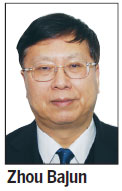Beijing will not waver in deciding on fundamental matters
Updated: 2014-09-01 06:34
By Zhou Bajun(HK Edition)
|
|||||||||
The Standing Committee of the National People's Congress (NPCSC) has framed the method for 2017 Chief Executive (CE) election by universal suffrage in the HKSAR. The NPCSC's Aug 31 decision definitely rules out the opposition's demands for "public nomination" and a "three-track proposal". It clearly stipulates that only the Nominating Committee (NC) is empowered to choose two or three CE candidates. Candidates should win more than half of the NC members' votes. Therefore, the opposition dream will not be realized.
Some local commentators argue that the NPCSC's decision will be too inflexible to meet Hong Kong's political aspirations and therefore won't lead to universal suffrage in 2017.
In modifying the methods for the 2007 CE election and 2008 Legislative Council (LegCo) election and modifying the two election methods for 2012, it was the HKSAR government which put forward the so-called "mainstream package" involving public consultations. However, the government didn't deliver any concrete proposals for the 2017 CE universal suffrage in the first stage of the five-month public consultation. In the second stage of the public consultation, the government will develop a framework laid out by the NPCSC. This really is a significant change. The reason is the CE election by universal suffrage isn't really about political reform. It is ultimately about constitutional development. It will have profound implications on future relations between the Hong Kong and the nation and between the SAR and central governments.
Modifying the two election methods for 2007 and 2008, and also for 2012 definitely affected relations between Hong Kong and Beijing. Electing the CE by universal suffrage will also affect this relationship. Only by strictly conforming to the Basic Law and decisions by the NPCSC, can Hong Kong achieve universal suffrage without breaching the "One Country, Two Systems" principle.

Nevertheless, the opposition and their foreign backers constantly demand "genuine universal suffrage" based on so-called "international standards". They are even threatening to launch the "Occupy Central" campaign to force Beijing to accept their demands. They want to overhaul constitutional arrangements for Hong Kong and dismantle the "One Country, Two Systems" principle.
However, at this critical juncture the incumbent CE and his team are entangled in administrative problems. Therefore, the central government has to provide more assistance to the CE and his colleagues by confronting the opposition. It is important to note that NPCSC Chairman Zhang Dejiang, while in Shenzhen in July, met with the "Love the Nation, Love Hong Kong" camp. The meeting further supported the CE and defended the fundamentals of the SAR's constitutional development. The central government has the responsibility to get the HKSAR's constitutional development right. This will ensure the SAR government and the Hong Kong can implement universal suffrage in accordance with the Basic Law and NPCSC decisions.
The political situation in Hong Kong is more complicated now. The opposition camp is a loose alliance. The views of this opposition alliance range from one extreme of the political spectrum to the other. The Democratic Party used, in early 2010, to be made up of "moderate democrats". Some Hongkongers hope the party will return to its "moderate" roots when promoting universal suffrage of the CE in 2017.
But times have changed. Four years ago the Democratic Party showed respect for the central government by accepting its methods for electing five new members from the district constituency according to the Basic Law and the NPCSC's decisions. At present, the whole opposition camp demands "genuine universal suffrage". The difference between the Democratic Party and other opposition groups is one of political tactics rather than political views. The current political polarization of Hong Kong is unprecedented. There are no "moderate democrats". The whole opposition camp is making every effort to turn the HKSAR into an independent political entity.
Hong Kong could accept representatives from the opposition camp running for CE in the 2007 and 2012 elections in accordance with the prevailing political situation and also prevailing methods for electing the CE. But because of their strong political differences with the central government over fundamental issues, the central government has to prevent the likelihood of someone who opposes Beijing taking over the administration of the territory.
It will be interesting to see how the opposition camp reacts to the NPCSC decision on the 2017 CE election. It has already announced a series of protests including threatening to illegally occupy Central in order to paralyze Hong Kong's main business hub. But whatever the opposition does, you can be certain the central government will not waver in its decision on fundamental matters essential for the future of Hong Kong.
The author is a veteran current affairs commentator.
(HK Edition 09/01/2014 page9)